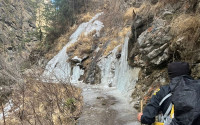National
At Covid-19 helpline, thousands of calls from Nepalis looking for accurate information
Since being instituted on Friday, the 1115 helpline has received over 22,000 calls regarding Covid-19, its spread, symptoms and precautions.-(12).jpg&w=900&height=601)
Anup Ojha
Shiva Ale Magar answers hundreds of phone calls every day, fielding questions regarding Covid-19, its cause, symptoms, how it spreads and precautions to limit its spread.
Magar, a 28-year-old high school graduate, duly records the name, age and location of the caller before hanging up and immediately answering the phone, which does not cease to ring.
“Covid-19 is a disease caused by a new strain of coronavirus that has not been previously identified in humans,” he explains in response to a query about what the disease is. He then provides a list of symptoms—trouble breathing, dry cough and fever above 100.4, before going to provide precautionary measures.
“For precaution, you need to wash your hands with soap and avoid touching your nose, eyes and mouth with unclean hands,” says Magar.
Magar is one of six phone operators manning the toll-free number 1115, a helpline set up by the Epidemiology and Disease Control Division in coordination with the World Health Organization.
Since March 13, the day the helpline was instituted, the number has received over 22,000 queries, reflecting just how starved for reliable information the public is, according to Dr Basudev Pandey, director of the Epidemiology and Disease Control Division.
Nepal has so far reported only one case of Covid-19 in late January. The patient has since recovered. Globally, as of Tuesday, there had been 188,780 confirmed cases with 7,495 reported deaths.
“The toll-free number is available so that people do not panic,” said Mahendra Shrestha, director-general of the Department of Health Services. “We want to give proper guidance to the public, along with WHO’s guidelines.”
According to Shreshta, the Policy, Planning and Monitoring Division of the Health Ministry had provided three hotlines—9851255837, 9851255834, and 9851255839—to provide information about Covid-19 to the people. But the new toll-free helpline, 1115, was only instituted after the World Health Organization officially declared Covid-19 a global pandemic on March 11. On the very first day, the helpline received over 8,000 calls, said officials.
The number is answered by six people working in two shifts from a help desk in Jawalakhel. Most of the questions people have are regarding what the coronavirus is, how one can catch the disease, how it gets transmitted, and whether it can be treated, said Sachin Rawal, a 20-year public health assistant, who also mans the helpline.
“It feels good to give accurate information to people regarding a disease that has gripped the world, but we don’t even have time for a break here,” said Rawal, a graduate of the Karnali Academy of Health Sciences.
According to Rawal, the phone calls are so incessant that oftentimes, they are unable to answer calls. There have even been prank calls and calls about unrelated health complications, but the operators focus on providing WHO-sanctioned information about Covid-19. All of the six operators underwent a two-day training programme at the Department of Health Services.
If anyone reports any symptoms, the operators ask them to immediately visit their nearest doctor and get tested. And if they are unable to answer any questions or if more specialised knowledge is required, they forward these calls to the three mobile numbers operated by the Health Ministry. These numbers are answered by public health officers from the ministry.
Rabi Kanta Koirala, one of the public health officers who responds to the number 9851255837, said that he answers over 50 calls a day forwarded from 1115.
“Earlier, we were answering calls but when the pandemic was announced and the calls started to increase, we outsourced operators for the helpline,” said Koirala. “When they can’t answer questions, we handle those calls.”
Although the number of calls has declined steadily since the first day, the helpline will remain open until the pandemic has passed, according to director Pandey of the Epidemiology and Disease Control Division.
The mandate of the Jawalakhel help desk will also be expanded to keep track of patients suspected of having Covid-19 and foreigners who have been asked to self-quarantine themselves after entering Nepal from infected countries, said Pandey.
“We are in the process of instituting software that will help keep track of all these people and we will also be hiring more staff as we are short on human resource,” said Pandey.




 11.43°C Kathmandu
11.43°C Kathmandu.jpg)













